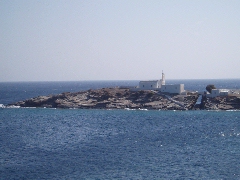Faros - Chryssopigí - Panagía tou Vounoú - Platýs Gialós |
||
|
Evaluation:
This pleasant and not very long hike connects some beautiful spots on
the south- east coast of Sífnos. It deserves an evaluation of **.
There is a possibility to combine the hike with the
hike from Platýs Gialós to Kástro; you can do this by not taking the turn to Platýs Gialós just past the
monastery of Panagía tou Vounoú, but instead to switch to the hike to
Kástro. Estimated time:
The actual hiking time takes a little under two hours: 55 minutes to the
monastery of Panagía tou Vounoú and from thereon another 50 minutes to
the beach of Platýs Gialós. But along the way there are so many
interesting places, that the hike can definitely fill a complete day:
you can take a swim both before and after the hike, Chryssopigí is a
place where you have to take quite some time to visit and Panagía tou
Vounoú is an ideal picnic spot. Route description: In Fáros you depart from the little bus
square and the small harbour and you walk over the first little beach. You
then cross the cape in front of you, on the left of the ouzéri O Fáros
(there is a signpost to Glyfó), and you traverse the broader, second
beach with trees.
Panoramic view on the second beach of Fáros. The path with the typical Greek gate, near Chryssopigí. you
get to the beach of Apokoftó: the sand is great, there are some smooth
rocks in the water, some beautiful large trees and the magnificent
terrace of the restaurant To Apokoftó – you have left Fáros some 20
minutes ago.
Panoramic view on the peninsula of Chryssopigí. After your visit you take the concrete road inland, but already after some 10 metres you can take a staircase off the left. These 250 steps lead you all the way up to the main road to Platýs Gialós. The staircase is interrupted by a paved part and by a small road for a couple of times and it reaches the main road next to the bus shed. |
Exactly
across this shed you take a concrete path: it passes a house and
immediately past the house it turns into a narrow trail, which goes up
on the left-hand side of this house. After climbing up for 5 minutes you
DO NOT take the gravel road off the right, but you go straight. You
continue to climb up, sometimes over stone steps; the trail is a little
overgrown (also here it is a good idea to wear some long trousers), but
after about 10 minutes you do reach the main road. The very final part
is a little difficult since you have to climb up a steep gravel slope
– unfortunately this is often the case to get to roads, because the
ancient trails are not taken into account when these roads are
constructed. You follow the
road towards the left. In front of you and high up you can see the
beautiful summit of Agios Andréas. After 5 minutes you find a little
asphalt road on the left (there is also a signpost to Panagía tou Vounoú)
and you follow this road for some 8 minutes. After quite some
climbing up you will thus get above a deep valley. The
gate on the left of the monastery is open and in this way you reach a
marvellous shady yard: there is a stone table, there are some benches,
and everything seems to wait for you to have a picnic. It is very
peaceful here, but unfortunately the church is closed. From this spot
there is no direct trail to Platýs Gialós, which looks really nearby.
You thus have to take the same way back, until you arrive at the main
road. You follow this road further to the left, till you find a
beautiful path, after some 4 minutes and immediately past a small white
building of the electricity. This path takes a left sharply and there is
also a sign pointing to Platýs Gialós. [If you stay on
the asphalt road for some more minutes, you will get to the trail that
has been described in the
hike Platýs Gialós -Kástro
– in this way you can actually continue to traverse the whole island.]
Monopáti to Platýs Gialós underneath Panagía tou Vounoú. You continue to
walk on a beautiful and flat trail; on the left and above you there is
the monastery and on the right you can see a very green valley –
sometimes you can even hear some water splashing, which seems rather
bizarre (this was on the 15th May 2003). After 5 minutes you
get to a junction and you take a right, still following the black
plastic water pipe. Another 2 minutes later you reach a gravel road,
which you follow by taking a right and down. After some 100 metres of
concrete and at a sharp curve to the right, you go straight, on the
left-hand side of a large cistern. You climb up for a little while and
you thus reach a beautiful trail; in about 5 minutes this trail leads
you down, in between walls and olive trees. You get to another
gravel road, which turns into concrete after 2 minutes. It now takes
only 6 more minutes to arrive at the main road, next to a small bridge
and near the beginning of the beach of Platýs Gialós. If you have to
take the bus later on, you are now in between the 3rd and the 4th bus
stop – but obviously you first want to enjoy the wonderful sandy beach
and the shallow sea for a while.
For
the printer-friendly version |
|




